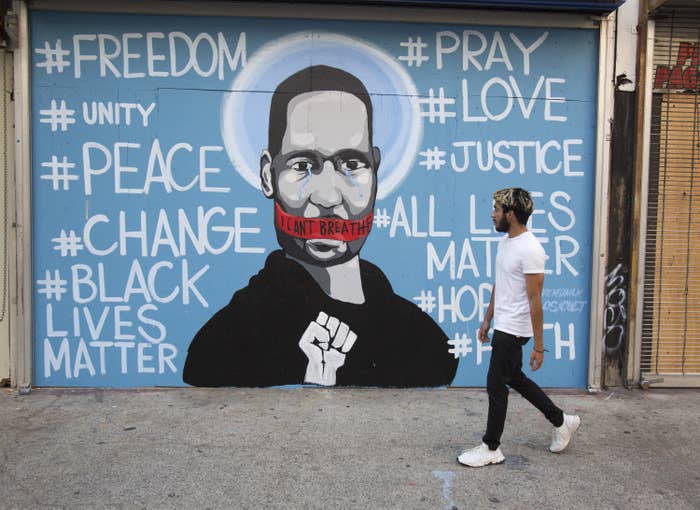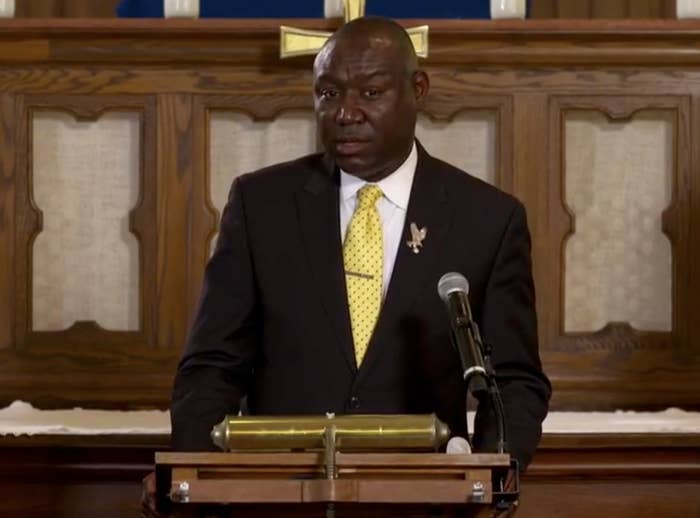
George Floyd died due to asphyxiation, an independent autopsy found, and while local officials also pointed to underlying health conditions, they agreed a police officer's compression of his neck also led to his death.
"George died because he needed a breath," Benjamin Crump, an attorney representing Floyd's family, said Monday as the new autopsy's findings were revealed. "He needed a breath of air."
Floyd's death last week at the hands of the Minneapolis Police Department has sparked outrage and protests across the country, and Officer Derek Chauvin has been charged with third-degree murder. The officer pressed his knee on Floyd's neck for more than eight minutes, while Floyd gasped for air and begged Chauvin and three other officers on the scene to stop.
According to footage taken by a bystander, those eight minutes included more than two minutes where Chauvin continued to press his knee on Floyd's neck even though another officer said he could no longer find a pulse.
Though the four officers have been fired and Chauvin is now facing criminal charges, Floyd's family and attorney have taken issue with some of the official findings from the Hennepin County Medical Examiner's office. The office's full autopsy report was released later Monday, but according to a criminal complaint, examiners found no evidence of "traumatic asphyxia or strangulation."
The coroner's official determination was released Monday night, naming the cause of death as "cardiopulmonary arrest complicating law enforcement subdual, restraint, and neck compression" and that his death was a homicide. The report also noted that Floyd had heart disease, fentanyl intoxication, and recently used methamphetamine.
Before the official cause of death was released, Crump disputed the role of any underlying conditions, saying Floyd was healthy at the time and that his death was entirely the result of his violent encounter with police.
"The ambulance was his hearse," Crump said. "Beyond question, he would be alive today if not for the pressure applied to his neck by fired officer Derek Chauvin and the strain on his body from the two additional officers laying on his back."

Crump said that according to a report obtained by the family, EMTs found Floyd not breathing and without a pulse when they began providing medical attention at the scene.
On the way to the hospital, EMTs continued to try to get Floyd breathing again, and applied one electric shock, Crump said. Despite their efforts, Floyd was still not breathing when they arrived at the hospital.
"What we know is that George was living, breathing, and talking until we see those officers restrain him while he's facedown in handcuffs with Officer Chauvin having his knee lodged into his neck for over eight minutes," the attorney said.
Though the official cause of death only mentioned "neck compression," the experts who worked on the family's autopsy report said the evidence was consistent with mechanical asphyxia.
One of them, former New York City chief medical examiner Michael Baden, said Floyd had "no underlying medical condition that caused or contributed to his death."
"He was in good health," said Baden, who in 2014 conducted an autopsy on Michael Brown, the Ferguson, Missouri, teenager who was killed by a police officer.
Baden said the pressure applied to Floyd's neck, as well as the pressure on his back from two other officers seen in the video, cut off air to his lungs and blood flow to his neck, making him lose consciousness.
"The compressive pressure to the neck and back are not seen at autopsy because the pressure has been released by the time the body comes to the medical examiner's office," Baden said. "You could only see the serious compressive pressure while the pressure is being applied, or as in this instance, we can see it on video."
The cause of death, Baden said, is asphyxiation due to compression of the neck.
"Unfortunately, many police think that if you can talk, you are breathing," Baden said. "That's not true."
